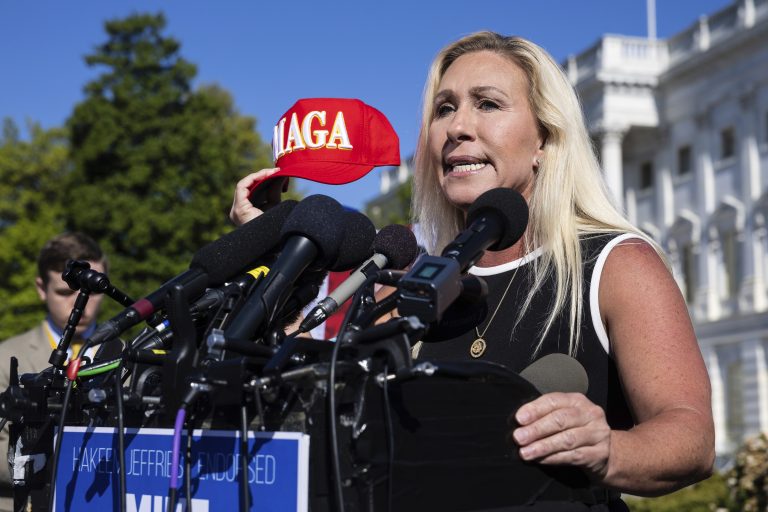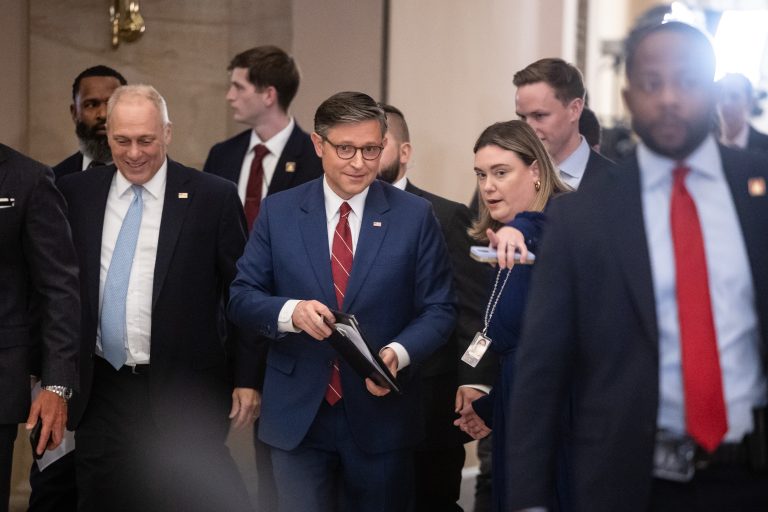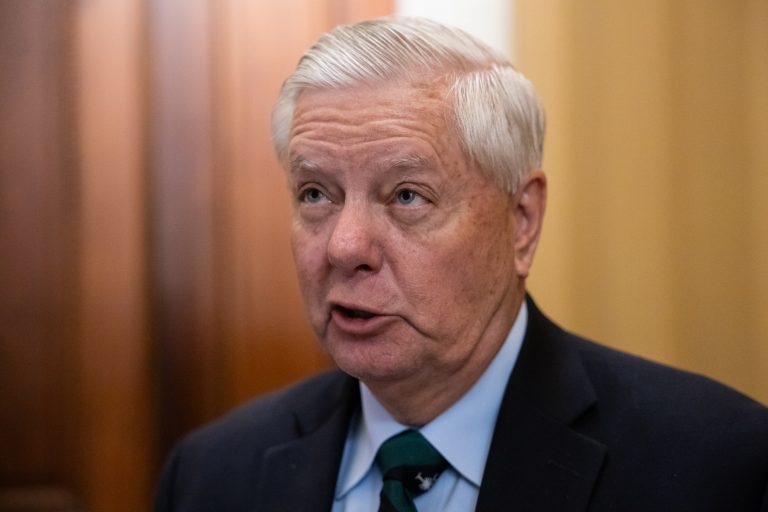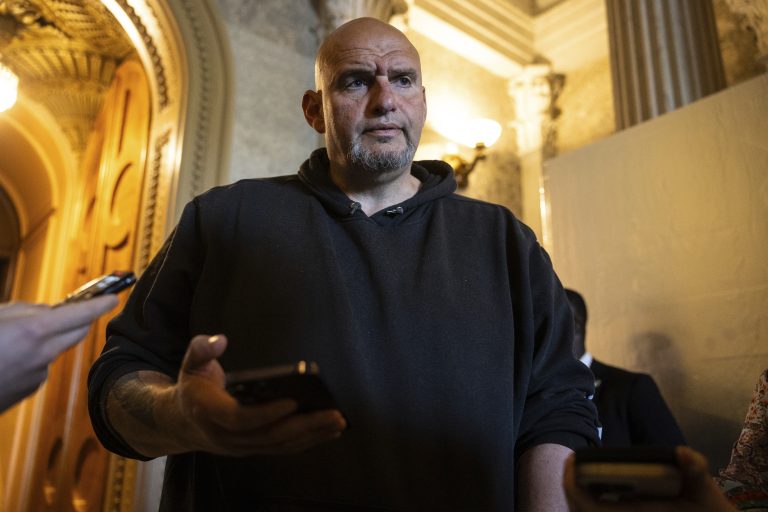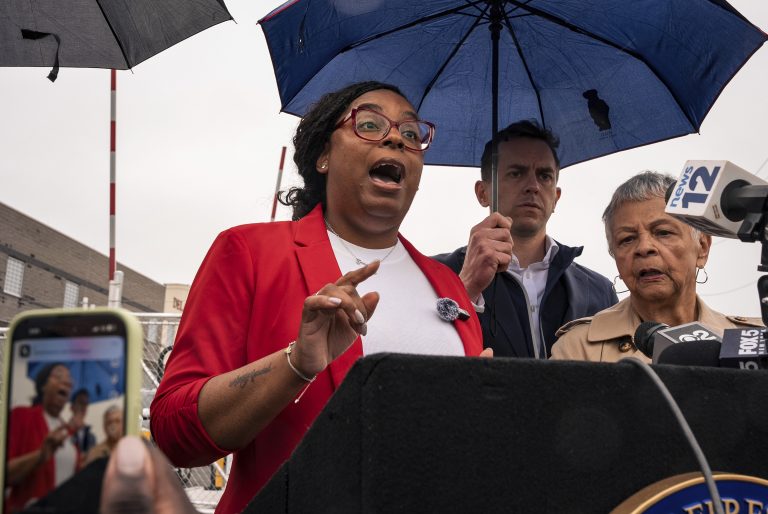President Donald Trump’s call for House Republicans to support releasing Jeffrey Epstein-related documents was a stunning capitulation after a months-long campaign to block the vote.
It was also a specific defeat for Trump at the hands of a despised GOP opponent: Rep. Thomas Massie of Kentucky.
“He got tired of me winning,” Massie said of Trump’s U-turn in an interview Monday morning.
Insisting “I DON’T CARE!” in a late-night Truth Social post, Trump was bowing to the inevitable — a broad House Republican mutiny on a vote that was only scheduled because Massie forced it. It was the result of Massie and Rep. Ro Khanna (D-Calif.) launching a discharge petition aimed at sidestepping senior GOP leaders who desperately wanted to avoid bringing the issue to the House floor.
The campaign to avoid the vote got remarkably ugly in the days before Trump finally conceded, with the president personally attacking Massie for recently remarrying after the sudden death last summer of his wife of more than 30 years. Just hours before Trump’s reversal, one of his top political advisers called him “garbage” in an X post.
That adviser, Chris LaCivita, is carrying out a Trump-ordered effort to unseat Massie from the rural northern Kentucky seat he has held since 2012. Trump recently endorsed a challenger, former Navy SEAL Ed Gallrein, in the GOP primary.
Massie has not flinched from the threats. Politically, he has seen the best fundraising of his congressional career, entering October with more than $2 million in his campaign coffers. As for the personal attacks, Massie said Monday he and his wife were laughing them off.
“She said, ‘I told you we should have invited him to the wedding!’” Massie said.
Massie’s efforts around Epstein have been no laughing matter for the White House, with top aides and legislative affairs staff furiously scrambling late last week to head off the completion of the discharge petition.
That included pulling Rep. Lauren Boebert (R-Colo.) into the White House Situation Room in the final hours to try to persuade her to remove her name from the petition she had signed alongside GOP Reps. Marjorie Taylor Greene of Georgia and Nancy Mace of South Carolina, a survivor of sexual assault. All three have cast their support for the petition as an effort to protect women.
The effort failed. The three female House Republicans held firm, and the petition notched its final and 218th signature Wednesday moments after Rep. Adelita Grijalva (D-Ariz.) was sworn in following her September special election win.Despite a final barrage of attacks from the president over the weekend — which included Trump calling his once-close ally Greene a “traitor” and threatening a GOP primary against her — backers of the Massie-Khanna discharge effort knew they had the president beat.
There were emerging signs that it was Massie, not Trump, who had his fingers closer to the pulse of the MAGA base.
Rep. Troy Nehls (R-Texas), a top Trump ally in the House, posted online he would be “voting NO on the Epstein Hoax” as he sought to rally Republicans to “stand by” the president’s side. Nehls received an immediate barrage of online pushback, suggesting a position against full transparency on Epstein would not be sustainable.
Massie, in conjunction with the three GOP women who signed the discharge petition, have sought to put Epstein’s victims front and center amid the battle. They invited several to Capitol Hill in September to keep the fight in the public eye as members returned from the summer recess. They are tentatively scheduled to appear together again Tuesday ahead of the final House vote.
“This shouldn’t have been a battle, and unfortunately, it has been one,” Greene said as she left a meeting with Epstein victims in September.
Yet for months, senior White House officials labored to convince rank-and-file Republicans to keep their names off Massie’s discharge effort. That, according to five people granted anonymity to discuss private conversations, included warnings that any effort to support an Epstein vote would be viewed as a direct and personal move against the president.
Trump has denied wrongdoing in relation to the Epstein allegations, and no evidence has suggested that Trump took part in Epstein’s trafficking operation. The president also has maintained that he and Epstein had a falling out years ago.
“President Trump has been consistently calling for transparency related to the Epstein files,” said Abigail Jackson, a deputy White House press secretary, in a statement. “The Democrats knew about Epstein and his victims for years and did nothing to help them until they thought they could weaponize the files against the President.”
In an effort to undercut Massie’s effort, GOP leaders and the Justice Department worked to release 30,000 pages of DOJ documents in early September, right after Massie could begin gathering signatures on his petition. But lawmakers quickly realized most of the materials had been previously released.
Around that time, the White House’s key legislative affairs liaison to the House, Jeff Freeland, was on the Hill, seeking to head off Massie right after lawmakers returned from recess.
“Jeff introduced himself to me outside of the Capitol, and he said I was moving too fast for him,” Massie said in the interview. “I told him I made a mistake by getting 12 sponsors [on the Epstein bill], because I had given him his whip list to block the most likely signers” of the discharge petition.
Over the past week, it became clear to House GOP leaders that they would no longer be able to keep the Epstein measure off the House floor. Shortly after Grijalva signed, Speaker Mike Johnson announced he would expedite the vote, holding it this week rather than next month as required under the discharge petition. Still, with Trump opposing the effort, he maintained Massie’s legislation was reckless and “moot” now that the House Oversight Committee was heading up its own probe.
Last week, Johnson tried calling one of the three GOP women who had signed on to Massie’s discharge petition. The member looked down at her phone and let the call go to voicemail, according to two people granted anonymity to discuss a sensitive matter who declined to identify the specific lawmaker.
Trump’s Sunday night edict was directed only at House Republicans, according to Trump officials. The president could order the release of the entire Epstein document trove at any time, vote or no vote. So far, he’s declined to do so.
Senate GOP leaders have not committed to holding a vote on the Epstein bill if the House passes it as expected this week. While Republicans still widely assume the measure will die in the other chamber, it will be hard to argue to GOP senators that they should take the political heat while their House counterparts get to take a consequence-free vote.
Massie has been working with Sen. Jeff Merkley (D-Ore.), who authored a Senate version of the bill, to bring the matter to a head across the Rotunda. Senate Democrats are already exploring options to force a vote in the coming weeks.
Massie said last week that the Epstein drama reflects how Republicans are starting to take stock of a post-Trump political world.
“They need to look past 2028 and wonder if they want this on their record for the rest of their political career,” he said.
“Right now, it’s OK to cover up for pedophiles, because the president will take up for you if you’re in the red districts — that’s the deal,” Massie told reporters last week. “But that deal only works as long as he’s popular or president. … If they’re thinking about the right thing to do, that’s pretty obvious: You vote for it.”




